- Home
- Taylor Caldwell
Dear and Glorious Physician Page 4
Dear and Glorious Physician Read online
Page 4
A gentle god. That was absurd. The gods were not gentle. They were jealous of their honor, and they were vengeful and remote and powerful. Diodorus stared at Lucanus. His first thought was to reprove the boy, and to make a mental note to request Aeneas to punish his presumptuous son. The words of cold rebuke were already on the lips of Diodorus when the moon struck fully on the face of Lucanus, and it became supernaturally radiant.
Then he remembered what this boy had said: “He loves her.” The gods did not ‘love’ men. They demanded worship and sacrifice from them, but man, as man, was a worthless thing to the gods.
“He loves her.” Could it be possible that the Unknown God had as one of His attributes the quality of loving men? Oh, the absurdity! The presumption! And what was he, Diodorus, doing here in this moonlight talking to a child, the son of a miserable freedman, as a noble man might talk with his equal?
Diodorus stood up abruptly, in one strong and lithe movement. “Come, child, it is late, and I will take you to your parents.”
He was astonished at his own words. What was this child to him, this child of Aeneas? What did it matter whether he found his way home or not, or wandered in the dark until dawn? But this was the son of Iris, and all at once Diodorus longed to see his old playmate. Too, there was danger in the sweet-smelling but menacing distance between the great and lesser houses.
Lucanus rose, and in the moonlight Diodorus could see that the boy was smiling shyly. “Master, will you take that stone to Rubria and lay it on her pillow tonight, for part of the Unknown God is in it.”
The stone, the sentient stone. Was it really pulsing in his, Diodorus’, hand, like a slow and reflective heart full of mystery? All at once Diodorus was no longer afraid of the stone. Sheepishly, he said to himself, It is a pretty and unusual thing, and might amuse the little Rubria, who loves strangenesses. He put the stone in the pouch which hung from his leather girdle. But Lucanus was offering him a small woolen bag. Diodorus took it; from it emanated a wild and intense odor. “It is herbs,” said Lucanus. “I gathered them today in the fields, as if I were told. Master, have a slave steep them in hot wine, and let Rubria drink of it, and it will ease her pain.”
“Herbs!” exclaimed Diodorus. “Child, how do you know that some of them may not be deadly?”
“They are not deadly, Master. To be certain, however, I ate a quantity of them myself, hours ago, and a headache I had disappeared.”
Diodorus was intrigued. He put his hand roughly under the chin of Lucanus and tilted up his face to study it, half laughing. But the boy had spoken with authority; he had said, “as if I were told.” It was possible that Apollo himself, who might possess such a face, such a clear brow, had directed the boy. It could do no harm to do as Lucanus suggested, and Diodorus stuffed the little bag into his pouch. “She shall have it at midnight, when she usually awakens,” he promised.
He took Lucanus’ hand like a father, and together they moved through the golden half-light, keeping carefully to the earthen path for fear of snakes. Diodorus was thinking. This was no ordinary boy, but a boy of intelligence and fearlessness and thought. No doubt he was being prepared by Aeneas to follow in his steps as a bookkeeper. For some reason this annoyed Diodorus. “You are very young, boy,” he said, “but surely you have often thought of yourself as a man. What are your desires?”
“To find the Unknown God, Master, and to serve Him, and in His Name to serve man,” replied Lucanus. “I can best serve man as a physician, which is my dear desire. I have been to the harbor and I have seen the sick men in the ships, and the dying, and they come from every part of the world, and I have prayed that I may help them. I know the philosophers and the physicians of Greece, and I have read their books of remedies for the ills of men, both mental and physical, much of which they had taken from the Egyptians. And I have often visited the houses of the physicians in Antioch, and they have not driven me away, but humored me and explained many matters to me. And I am learning other languages, including Egyptian and Aramaic, so that I may speak to sufferers in their own tongues.”
Diodorus felt a vast astonishment. He pressed Lucanus’ hand, and said, musingly, “There is a great school of medicine in Alexandria, of which I have heard much.”
“There I shall go,” said Lucanus, simply. “I too, Master, have heard of it, for the physicians in Antioch speak of it reverently. It will cost me much money, but God will provide it.”
“So, we have a God, who not only does not possess a name, or understandable attributes, or a face or a form, and who is everywhere simultaneously, but He is also a banker!” said Diodorus with a wry smile. “Do you think He will require interest also, my child?”
“Most certainly.” The boy’s voice was grave and filled with surety. “My whole life, my whole devotion.”
Diodorus thought that if a man had spoken so he would believe him mad. He, Diodorus, had often heard Jews speaking of the wise men in the gates, who thought of nothing and wrote of nothing but their God. But the Jews were a people no one could ever understand, least of all a Roman, though Caesar Augustus, being a tolerant man and superstitious in addition, had ordered that in Rome the Jewish God should be given some recognition, if only to persuade Him to soften the stiff necks and sullen resentment of His people against the Romans, and thus make the ruling of them less difficult. Diodorus began to laugh softly to himself. He remembered how he, as a young tribune, had offered to put a statue of the Jewish God in the Roman temple in Jerusalem, and how horrified the high priest had been, and how he had raised his hands and shook them violently in the air as if either imploring his God to strike the tribune dead or cursing him silently. Diodorus, bewildered, had gathered that he had made an unpardonable error, but how, or why, he could never understand from the stifled imprecations of the priest. He had tried to reason with the holy man; how could a statue of the Jewish God in a Roman temple affront Him, and why should He despise the honor of Romans? The high priest had merely torn his beard and rent his garments, and he had looked at Diodorus with such terrible eyes that the poor young tribune had hastily taken his leave. He had been confirmed in his hesitant belief that the Jews were madmen, especially their priests.
But Lucanus was a Greek, not a Jew, though he spoke of devoting his life to the Unknown God, as the Jews spoke of so devoting their lives to their own God. Diodorus remembered how, in the streets of Jerusalem, he had seen men called rabbis, followed by humble crowds who listened to their words of wisdom eagerly. There were some reputed to be miracle workers, and this had interested Diodorus, who believed fervently in godly miracles. But he did not believe in these men, for they were often barefoot and shaggy and desperately poor, for all their lambent eyes and strange, incomprehensible words. Diodorus, walking with Lucanus, shook his head. “You should visit the temple of the Jews in Antioch,” he said, with amusement.
Lucanus said serenely, “I do visit it, Master.”
“So!” exclaimed Diodorus, holding aside a thorned bush for the child, as he would have done for his daughter. “And is their God the Unknown God?”
“Yes, Master, I am sure He is.”
“But He does not love all men. He loves only the Jews.”
“He loves all men,” said Lucanus.
“You are wrong, boy. I offered to put a statue of Him in the Roman temple in Jerusalem, and it was refused.” Diodorus laughed. “Do the Jews object to your entering their temples? Ah, I remember now. In Jerusalem the temple had a place they called the Court of the Gentiles. But they could not enter the inner sanctum of the Jews.”
“I worship in the Court of the Gentiles in the synagogue in Antioch,” said Lucanus.
What a peculiar boy! But Diodorus began to think of the school of medicine in Alexandria. He said, “I think the Unknown God has arranged a way for you to study medicine, Lucanus,” and he laughed again, ruefully. He was a just and sometimes charitable man, but, like the ‘old’ Romans, he was prudent with money and believed that two pieces of gold should return to
a man accompanied by two more.
They had now reached the clearing before the gardens of the house of Aeneas. Tall palms stretched to the moon; the evening air was full of the scent of flowers. In the midst of them stood the shining white house of the bookkeeper, small, low and compact, streaked with the shadows of the palms. A light glowed from the open door, and as Diodorus and Lucanus approached it the doorway was filled by the shapely form of a young woman, and the light behind her made a cloud of gold of her loosened hair. She was clad in the simple white robe of a woman who spent all of her time in the home, and she called out anxiously.
“Lucanus? Is it you, dear one?”
Lucanus replied, “It is I, Mother.” Iris stepped down onto the grass, then stopped on seeing who was accompanied by her son.
“I greet you, Iris,” said Diodorus, and his voice was thick and low in his throat. He thought of the words of Homer: “Daughter of the gods, divinely tall and most divinely fair.”
“Greetings, noble Diodorus,” replied Iris, uncertainly. He had addressed her so gently, as a man addressed the wife of one of his peers, and yet the gentleness reached out to her eagerly and with an intonation of hope. For some reason Iris’ eyes stung with tears, and she remembered the playmate of her childhood. He had been so candid and courageous a boy, so truthful and kind, so honorable, so filled with affection for her. She had not seen him, except at a distance, for a long time, and since she had married Aeneas he had scarcely noticed her existence.
Aeneas appeared in the doorway, then he too stepped down. Seeing Diodorus, he bowed. “Welcome to our poor home, lord,” he said, in the trembling accents of a man who is overcome.
“It is not a ‘poor’ home,” replied Diodorus, irascibly. “It was the home of the former legate of Antioch, before my house was built for me, and he did not consider it unworthy.”
He pushed Lucanus towards his father, and said in a rough voice, “I have brought your boy home to you. He was in our garden, and he might have been smitten by a snake or a scorpion after sundown.”
Aeneas was all confusion and abject fear. He had offended Diodorus, and he turned with anger on his son. “It is nothing to you that your mother was disturbed, and about to go searching for you in the darkness. It is nothing that you have affronted the noble tribune — ”
“He did not affront me,” interrupted Diodorus. The light from the doorway slanted on Iris’ beautiful and distressed face. Diodorus yearned to put his hand consolingly on her shoulder. “The little Rubria is his playmate. I found him in the gardens, praying beneath her window, for she is ill. I have reason to thank him.” He watched Iris, and noticed that she had begun to smile in grateful relief. He said to the trembling Aeneas, and strove for an easy tone, “A most unusual boy, this of yours, Aeneas, and it has been a privilege to talk with him.” He hesitated. “My throat is dry. May I take a cup of wine with you?”
Aeneas was again overcome. He could hardly believe his own ears. He looked at Lucanus with respect. This was his son of whom the tribune had spoken! And it was because of this son that the tribune had condescended to ask for wine in the house of his freedman. Aeneas was dazzled. He could only mumble and stand aside until Diodorus had strode into his house. He looked briefly and dumbly at Iris, but she had put her arm about her son’s neck and was leading him forward. Aeneas followed, his knees quaking. The tribune had brought the boy home, when he needed only to order him out of his gardens, or, if kindly disposed, might have sent a slave with him in the darkness!
Diodorus had recovered his good humor. He stood in the small but not in the least humble room and surveyed it expansively. There were flowers in a bowl on the table, and flowers in the vases on the floor, which was of marble. The doorways leading to the kitchens and the bedrooms were hung with gay woolen cloth, which swayed in the night air pouring in the small windows and the door. Here and there Diodorus recognized, among the furniture left by the former administrator, chairs and tables from his father’s house, which had been given to Aeneas upon his marriage to Iris. Diodorus looked at one chair in particular, and with pleasure. It was of ebony, inlaid with ivory, and it had been one of his father’s favorites. There was even a little table of precious lemonwood, gleaming in the lamplight, which had belonged to Antonia. It held the silver lamp, with its tongue of bright flame.
“The slave I assigned to you does his work well,” said Diodorus, more and more pleased. He sat down in the ebony chair and stretched his brown and muscular legs before him with all the unaffected movements of a soldier. As Aeneas stood before him uncertainly, formally clad in a long white robe he, the bookkeeper, seemed more the patrician, with his long slender features and narrow face and head, than the frank and unceremonious tribune in his casual short tunic. Why, thought Diodorus, the poor creature even possesses a toga to wear in the secret bosom of his family.
“I have no wine worthy of you, Master,” said Aeneas. But Iris slipped gracefully behind a curtain and brought out a ewer and two silver cups, which Diodorus also recognized from his childhood. Iris, moving like a lovely and animated statue, placed the cups on the lemonwood table and poured the wine. A rosy light reflected back onto her face from the liquid, and Diodorus thought of a marble maiden struck by the sunset. He wanted to touch her miraculous hair, which he had touched so easily in his childhood. He could feel its silken lengths again, and he was all yearning. He thought that his mother, Antonia, ought to have opposed the marriage of Iris to Aeneas with more vigor.
“I am not a connoisseur of wines, thank the gods,” said Diodorus. “One vintage is the same as another to me.” He stretched out his hand for a cup and Iris gave it to him with her ineffable smile, for Aeneas was still too stunned for voluntary movement. “What, are you not drinking with me?” said Diodorus, in a burly tone. Aeneas snatched a cup, and some of the wine splashed on his shaking fingers.
Lucanus, obeying a slight gesture of his mother’s, bowed to Diodorus and bade him good night respectfully. Diodorus smiled gravely, and the boy left the room. Diodorus poured out a small libation to the gods, and Aeneas, still very pale, poured the libation also. The tribune watched as the Greek poured a little more wine, his lips moving reverently. “Ah, yes,” said Diodorus, “the Unknown God.”
“It is a Greek custom,” said Aeneas, apologetically.
“An excellent one,” said Diodorus, and his fierce face became almost bland. He turned his head and saw that Iris had followed her son. He was deeply disappointed, but as an ‘old’ Roman he also approved. “Tell me, Aeneas,” he said. “I am interested in that boy of yours. What are your hopes for him in the future?”
“May I sit, noble Diodorus?” asked Aeneas. He sat stiffly in a chair some distance from his guest. He pondered over Diodorus’ words, and was freshly amazed and humbled by this condescension. “I have thought, Master, that he would follow me in your service.”
“Keeping books and records, that boy?” asked Diodorus, scornfully. “Ah, no. Has he not confided in you that he wishes to be a physician?”
Aeneas, paling still more, could only stare. Certainly the boy had confided in him and in Iris, but Aeneas had severely frowned at the presumptuous thought, and had been offended. “I see that he did.” Diodorus nodded. “Well, then, my good Aeneas, he shall be a doctor.” Again he hesitated ruefully. “I shall send him myself to the school of medicine in Alexandria when he is older. In the meantime he shall take lessons with the little Rubria’s tutor.”
Tears rushed to Aeneas’ eyes. Before Diodorus could move, the bookkeeper had sprung to his feet and had prostrated himself before Diodorus’ dusty sandals. He was beyond speech; he could only mumble distractedly in his gratitude and incredulity.
“Come, come, man,” said Diodorus, who could never endure being thanked. “I have no son of my own, and this is the boy I ought to have had. He shall be a physician. Rise, Aeneas. You are not a slave. And have you forgotten that you took your lessons with me, also?”
He knew exactly what Aeneas’ pretensions w
ere, and how he considered his master a barbarian and he an exiled philosopher from a land he had never seen, and he knew how small, if how honest, a mind Aeneas possessed. Would Aeneas never forget that he was no longer a slave? Diodorus watched, scowling at the white-robed man at his feet. He moved them, as if fearful that Aeneas would kiss them in his extremity of wonder and gratitude, and this, from the husband of Iris, would have been unbearable to him.
Aeneas seated himself in his chair again and dried his tears. Diodorus considerately looked aside and his eye fell on a roll of parchment on the table beside him. He saw that it contained Aristotle’s treatise on Democracy and Aristocracy. Diodorus was immediately interested. He said, “There was delivered to me today some of the books of a new philosopher, Philo. There is much excitement about him, and I wished to compare him with Aristotle.”
For a moment hope awakened in the lonely tribune. He knew, from past experience in talking briefly with Aeneas, that though the freed-man could quote long sections of Plato and Aristotle exactly, and in Greek, he was incapable of any subtle understanding. Yet, still, hope came to Diodorus.
“Philo?” murmured Aeneas, faintly. A spasm of disdain, totally involuntary, passed over his long pale mouth. Then, fearful that he had again offended Diodorus, he hurried on: “Surely he must be a great philosopher.”

 Testimony of Two Men
Testimony of Two Men Wicked Angel
Wicked Angel The Arm and the Darkness
The Arm and the Darkness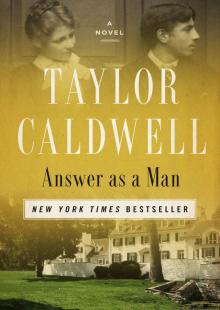 Answer as a Man
Answer as a Man Grandmother and the Priests
Grandmother and the Priests On Growing Up Tough: An Irreverent Memoir
On Growing Up Tough: An Irreverent Memoir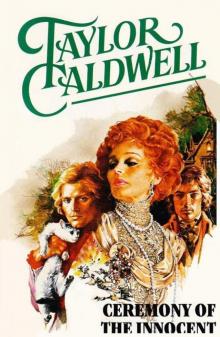 Ceremony of the Innocent
Ceremony of the Innocent The Listener
The Listener Bright Flows the River
Bright Flows the River The Earth Is the Lord's
The Earth Is the Lord's Dialogues With the Devil
Dialogues With the Devil A Tender Victory
A Tender Victory This Side of Innocence
This Side of Innocence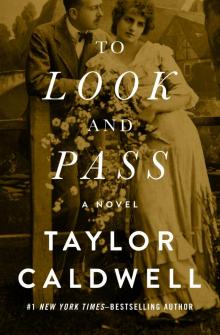 To Look and Pass
To Look and Pass The Strong City
The Strong City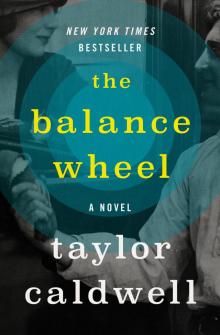 Balance Wheel
Balance Wheel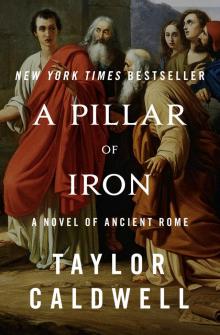 A Pillar of Iron: A Novel of Ancient Rome
A Pillar of Iron: A Novel of Ancient Rome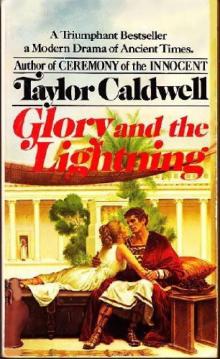 Glory and the Lightning
Glory and the Lightning Dear and Glorious Physician
Dear and Glorious Physician The Wide House
The Wide House The Final Hour
The Final Hour Never Victorious, Never Defeated
Never Victorious, Never Defeated Unto All Men
Unto All Men The Turnbulls
The Turnbulls Your Sins and Mine: The Terrifying Fable of a World Without Faith
Your Sins and Mine: The Terrifying Fable of a World Without Faith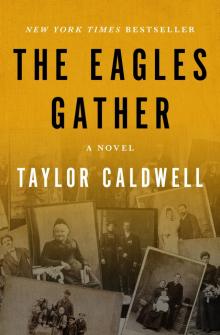 The Eagles Gather
The Eagles Gather Let Love Come Last
Let Love Come Last The Devil's Advocate: The Epic Novel of One Man's Fight to Save America From Tyranny
The Devil's Advocate: The Epic Novel of One Man's Fight to Save America From Tyranny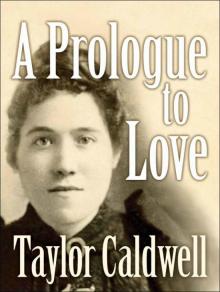 A Prologue to Love
A Prologue to Love Maggie: Her Marriage
Maggie: Her Marriage The Late Clara Beame
The Late Clara Beame Melissa
Melissa Great Lion of God
Great Lion of God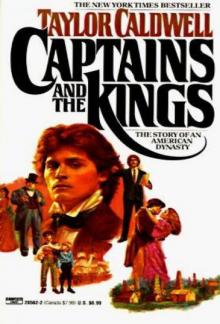 Captains and the Kings
Captains and the Kings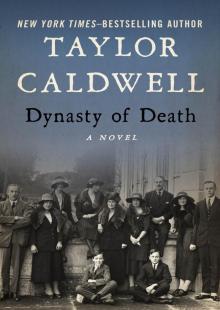 Dynasty of Death
Dynasty of Death No One Hears but Him
No One Hears but Him The Sound of Thunder
The Sound of Thunder There Was a Time
There Was a Time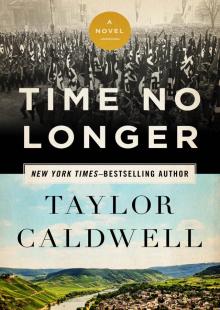 Time No Longer
Time No Longer I, Judas
I, Judas The Devil's Advocate
The Devil's Advocate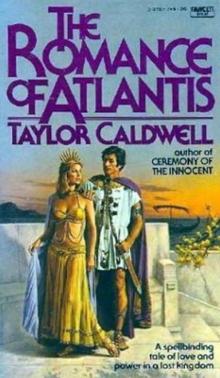 The Romance of Atlantis
The Romance of Atlantis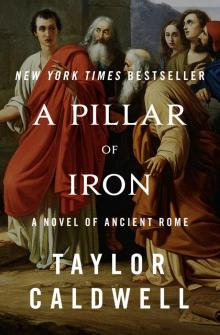 A Pillar of Iron
A Pillar of Iron On Growing Up Tough
On Growing Up Tough Your Sins and Mine
Your Sins and Mine